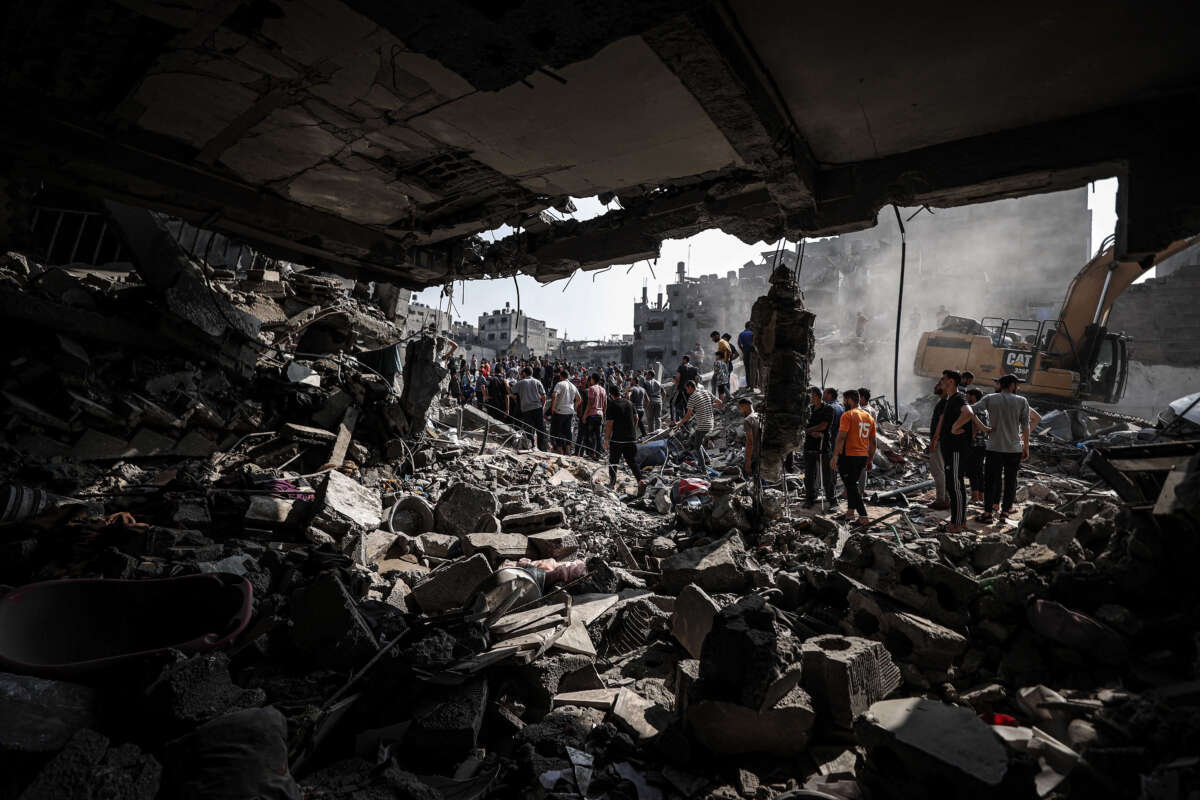One of the Israeli military’s air raids on a residential area of Jabalia refugee camp in Gaza this week caused nearly the area of an entire football field of destruction, a new analysis finds.
On Tuesday, Israeli forces launched the first of what would be a series of attacks on Jabalia, the largest refugee camp in Gaza. The military dropped five or six bombs on the area (reports vary), killing at least 110 people and wounding 300 others who officials know of so far.
According to an analysis of satellite imagery by The Washington Post, the raid caused roughly 50,000 square feet of damage, or a little less than the area of a football or soccer field. Within this area, the report found, buildings had either been totally leveled or otherwise heavily damaged. Rooftops near the blast were blackened with debris, the imagery shows.
The analysis found five different craters, and military expert and former war crimes investigator Marc Garlasco told the outlet that the blasts were likely caused by joint direct attack munitions, or JDAMs, which are among the types of weapons that the U.S. provides to Israeli forces. One of the craters was roughly 40 feet in diameter, the Post analysis found, meaning that it was likely caused by a bomb that was 2,000 pounds, according to Garlasco. Other experts have said the same.
“When a 2,000-pound bomb hits the ground, the earth turns to liquid,” Garlasco said.
Home to over 110,000 refugees in just a 1.4 square kilometer area, or just about 0.5 square miles, Jabalia was one of the most densely populated places in Gaza — and Gaza is already one of the most densely populated places on Earth. It’s unclear how many people are still in the area after Israel began its siege and ordered the removal of 1.1 million people from northern Gaza.
Israeli forces said that they killed a Hamas commander in the strikes on Tuesday. The bombing sent hundreds to the nearby hospital, which was already at capacity and is now having to treat patients on the floor and in danger of running out of power soon.
Israel Defense Forces spokesman Rear Admiral Daniel Hagari told The Washington Post that the collapse of Hamas tunnels contributed to the death toll — despite pictures and videos showing residential buildings completely leveled — and claimed that the military was acting in compliance with international law. But experts resoundingly disagree: the UN human rights office has said that the bombings in Jabalia are likely a war crime, judging by the number of civilians injured and killed in the blasts.
After purportedly killing the commander, Israeli forces then bombed Jabalia again. According to the Post, they bombed the area another time on Tuesday night. Then, on Wednesday, as large swaths of Gaza were under yet another phone and internet blackout, Israeli forces dropped another set of bombs, once again killing civilians and leveling numerous residential buildings.
Palestinian officials say that the Jabalia attacks alone have killed at least 195 people, with 120 still missing under the rubble. The death toll in Gaza since Israel began its siege is now at 9,061 Palestinians, including 3,760 children.
A terrifying moment. We appeal for your support.
In the last weeks, we have witnessed an authoritarian assault on communities in Minnesota and across the nation.
The need for truthful, grassroots reporting is urgent at this cataclysmic historical moment. Yet, Trump-aligned billionaires and other allies have taken over many legacy media outlets — the culmination of a decades-long campaign to place control of the narrative into the hands of the political right.
We refuse to let Trump’s blatant propaganda machine go unchecked. Untethered to corporate ownership or advertisers, Truthout remains fearless in our reporting and our determination to use journalism as a tool for justice.
But we need your help just to fund our basic expenses. Over 80 percent of Truthout’s funding comes from small individual donations from our community of readers, and over a third of our total budget is supported by recurring monthly donors.
Truthout has launched a fundraiser to add 500 new monthly donors in the next 10 days. Whether you can make a small monthly donation or a larger one-time gift, Truthout only works with your support.
